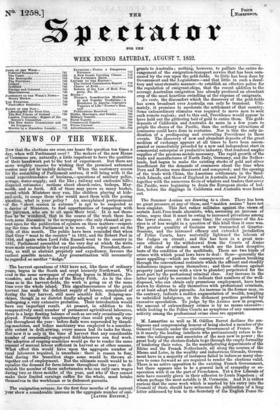The harvest operations of 1852 have not, like those of
ordinary years, begun in the South and crept leisurely Northward. We read in the same newspaper of reaping begun in Middlesex, De- vonshire, and on the shores of the Moray i Frith. As in the elec- tions so in the harvest-fields, the work s going on at the same time over the whole island. This simultaneousness of the grain harvest has made the deficient supply of labour, complained of during the hay harvest, still more sensibly felt. Reaping-ma- chines, though in no district finally adopted or relied upon, are undergoing a very extensive probation. Their introduction would have one important result. At present, in addition to the comparatively small number of permanent agricultural labourers, there is a large floating balance of such as are only occasionally em- ployed. Formerly this supplementary class could pick up stray 'obs throughout the year : before flails were superseded by thrash- ing,machines, and before machinery was employed to a consider- able extent in drill-sowing, every season bad its tasks for them. But now it is only in the time of harvest that any considerable number of occasionally-employed field-labourers can find work. The adoption of reaping-machines would go far to render the same amount of manual labour sufficient in harvest as at other seasons. What effect this would have upon the aggregate number of rural labourers required, is uncertain: there is reason to fear, that during the transition stage some would be thrown al- together out of employment. But the ultimate result would be to equalize the demand for farm-labour throughout the year ; to di- minish the number of those unfortunates who can only earn wages during two or three months of the year, and who if they cannot make their limited earnings suffice for the whole, must betake themselves to the workhouse or to dishonest pursuits.


























